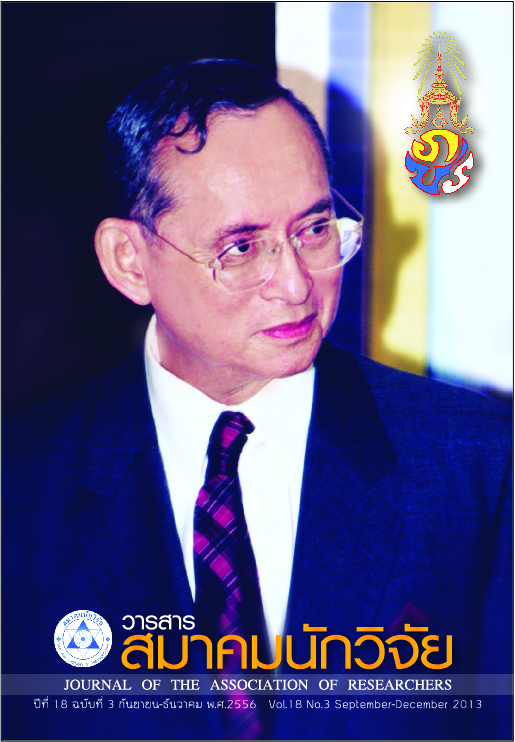Structural Equation Model Cause of Organization Citizen Behavioral of Officer in 5 Star Hotel in Thailand
Main Article Content
Abstract
The research has its objective to study the variable classes such as organizational membership
behavior, organizational tie, job satisfaction and executives’ leadership as well as to develop and check
the straightforwardness of the structural equation model cause of organization citizen behavioral of
offififfiicers in 5 star hotels in Thailand. It is made in the form of quantitative and qualitative research. The
tool used in the research is 389 questionnaires for the group of 5 star hotel personnel numbering 389
persons, using analytical implication statistics through SEM technique, collecting qualitative information
by using profound interview and informal interview, general observation and physical and environmental
survey. The information is analyzed by using content analysis. The result of the research found that
the organizational tie was in the most level. The job satisfaction, organization citizen behavior and executives’
leadership were in the much level and the developed model was in harmony with the distinctive
information. All variables and causes could be commonly explained about the variation of organization
citizen behavior up to 82% while the executives’ leadership did not directly inflfflluential against the
organization citizen behavior but indirectly inflflfflluential through the job satisfaction and organizational tie.
Article Details
บทความที่ปรากฏในวารสารนี้ เป็นความรับผิดชอบของผู้เขียน ซึ่งสมาคมนักวิจัยไม่จำเป็นต้องเห็นด้วยเสมอไป การนำเสนอผลงานวิจัยและบทความในวารสารนี้ไปเผยแพร่สามารถกระทำได้ โดยระบุแหล่งอ้างอิงจาก "วารสารสมาคมนักวิจัย"
References
การท่องเที่ยวแห่งประเทศไทย. (2551).สถิตินักท่องเที่ยว. ค้นเมื่อ 5 มกราคม, 2551,จาก http:// www2.tat.or.th/stat/web/static_index.php.
การท่องเที่ยวแห่งประเทศไทย. (2550). ค้นเมื่อ 21 กุมภาพันธ์, 2550, จาก http:// www.tat.or.th/pr.
สถิตย์ นิยมญาติ และคณะ. (2546). โครงการ “คุณลักษณะของผู้ประกอบการด้านการท่องเที่ยว ที่ประสบความสำเร็จ”. กรุงเทพฯ: สถาบันพัฒนาวิสาหกิจขนาดกลางและขนาดย่อม.
อารยา วรรณประเสริฐ. (2542). ภาพลักษณ์ประเทศไทยในสายตานักท่องเที่ยวชาวต่างประเทศ. ปริญญานิเทศศาสตรมหาบัณฑิต จุฬาลงกรณ์มหาวิทยาลัย.
อนุพันธ์ กิจพันธ์พานิช. (2546). รวมความรู้เกี่ยวกับงานโรงแรม = The Hotel. พิมพ์ครั้งที่ 3. กรุงเทพฯ : ฮิวแมนเฮอริเทจ
Bolon, D. S. (1997), “Organizational citizenship behavior among hospital employees: A
multidimensional analysis involving job satisfaction and organizational commitment,”
Hospital & Health Services Administration, 42(2), 221-241.
Hrebiniak, L.G. & Alutto, J. .A. (1972). Personal and role-related factors in the development of
organizational commitment. Administrative Science Quarterly.17(4), 555-573.
The importance of the employee’s perspective. Academy of Management Journal. 37(6),1543-1567.
Mowday, R., Steers, R. M., & Porter, L. (1982). Employee organization. linkage : The psychology of
commitment. absentecism and turnover. New York: Academy Prees.
Munene, J. C. (1995). Not-on-seat: An investigation of some correlated of organizational
citizenship behavior in Nigeria. Applied Psychology: An International Review, 44(2), 111-122.
Normann, R. A. (2000). Service management: Strategy and leadership in service business (3rd ed.).
Chichester: Wiley & Sons.
Organ, D. W. (1991). The applied psychology of work behavior. A book of reading. (4 th ed.). Boston,
R.R. Donnelley & Sons.
Organ, D.W. (1987). Organizational citizenship behavior: The good soldier syndrome. Massacusetts:
Lexinton.
Organ, D. W. & Konovsky, M. (1989). “Cognitive versus affective determinates of organizational
citizenship behavior”. Journal of Applied Psychology, 74(1), 157-164.
Organ, D. W. & Ryan, K. (1995). A meta-analytic review of attitudinal and dispositional predictors of
organizational citizenship behavior. Personnel Psychology. 48(4)(Winter), 775-802.
Plog, S.C. (2005). Starbucks: More than a cup of coffee. Cornell hotel and restaurant
Administration Quarterly. 46(2), 284-288.
Podsakoff, P. M., Aheame, M. & Mackenzie, S. B. (1997). Organizational citizenship behavior and
the Quantity and Quality of Work group performance. Journal of Applied Psychology. 82(2),
262-270.
Schnake, M. & Dumler, M. P. (1997). “Organizational citizenship behavior: The impact of rewards
and Reward Practice”. Journal of Managerial Issues, 9(2), 216-229.
Smith, P. C., Kendall, L. M., & Hulin, C. L. (1969). The measurement of satisfaction in work and
retirement. Chicago: Rand McNally.
Yoon, M. H. & Suh, J. (2003). Organizational citizenship behaviors and service quality as external
effectiveness of contact employees, Journal of Business Research, 56(8), 597-611.


